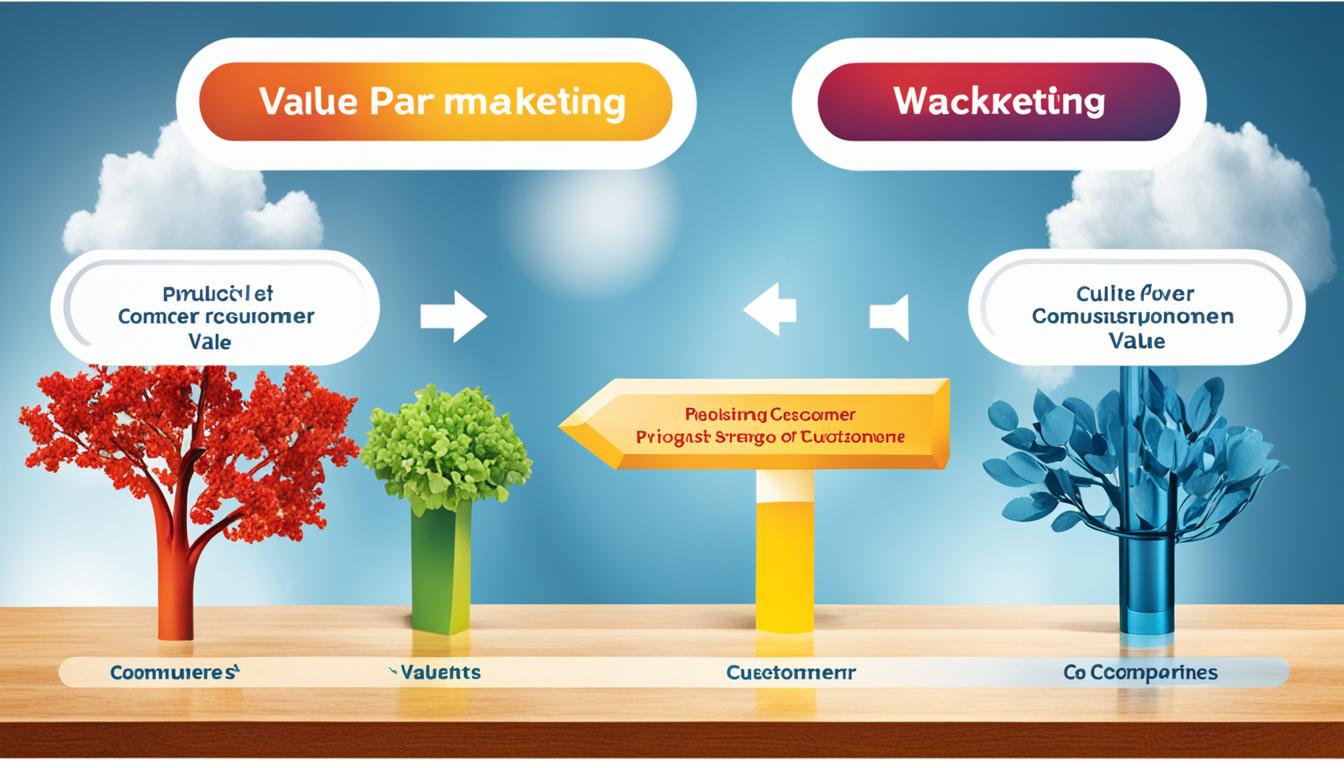Franchising is a popular growth strategy used by top businesses. A franchise business is a well-known company (franchisor) giving individuals or smaller businesses (franchisee) the right to use its brand name and expertise. Franchise marketing is essential for attracting and retaining customers for both franchisors and franchisees.
Key Takeaways:
- Franchise marketing is crucial for the success of franchisors and franchisees.
- Franchise marketing aims to attract and retain customers for franchise businesses.
- Franchising involves providing the right to use a brand name and expertise to individuals or smaller businesses.
- There are close to 800,000 franchise establishments in the US, generating over $800 billion and employing over 8 million people.
- Franchise marketing ensures brand consistency and helps businesses stand out from competitors.
What is Franchise Marketing?
Franchise marketing is a crucial aspect of building brand awareness, creating loyal customers, and driving revenue for both franchisors and franchisees. It encompasses various activities that aim to promote the franchise business and maintain brand consistency across different locations. A solid franchise marketing strategy is essential for attracting new customers and selling franchises to potential franchisees. This section will explore the key elements of franchise marketing and highlight the importance of developing a comprehensive marketing plan.
Why is Franchise Marketing Important?
Franchise marketing plays a crucial role in the success of franchise businesses. One key reason why franchise marketing is important is because it ensures brand consistency across all franchise locations. With a consistent brand image, customers can easily recognize and trust the franchise, regardless of the location they visit. This helps create a cohesive business image and enhances brand reputation.
Both franchisors and franchisees must share the same franchise marketing vision to achieve brand consistency. By aligning their marketing strategies and objectives, they can avoid roadblocks and ensure that all franchise locations portray a unified and compelling message to their target audience.
Franchise marketing also contributes to several important benefits. Firstly, it helps to build brand recognition, making the franchise more memorable in the minds of consumers. This increased recognition can lead to higher customer loyalty and repeat business, which are crucial for sustained growth.
Moreover, effective franchise marketing allows businesses to capture a larger market share. By promoting the brand and its offerings to a wider audience, franchisees can attract new customers and expand their customer base. This can result in increased revenue and profitability for both the franchisor and franchisee.
Additionally, franchise marketing efforts play a vital role in building strong customer relationships. Through targeted marketing campaigns and personalized messaging, franchisees can connect with their customers on a deeper level. This helps to foster loyalty, encourage positive reviews and referrals, and ultimately, drive business growth.
Overall, franchise marketing is critical for the success of franchise businesses. It ensures brand consistency, promotes recognition, captures market share, and builds lasting customer relationships. By investing in effective franchise marketing strategies, franchises can differentiate themselves from their competitors and achieve long-term success.
The Importance of Brand Consistency in Franchise Marketing
Brand consistency is essential in franchise marketing as it enhances brand recognition and strengthens customer trust. When franchise locations consistently deliver the same brand experience and messaging, customers are more likely to perceive the franchise as reliable and dependable.
A strong franchise marketing strategy should include guidelines and standards for maintaining brand consistency across all touchpoints. This includes consistent use of logos, colors, fonts, and tone of voice in marketing materials, advertisements, and customer interactions.
Brand consistency also extends to other aspects of the business, such as product quality, customer service, and overall brand experience. It is important for both franchisors and franchisees to prioritize brand consistency to effectively convey the brand’s values, mission, and unique selling points to customers.
By maintaining brand consistency, franchises can build a strong brand identity, foster customer loyalty, and ultimately drive business growth.
Franchise Marketing Vision: Aligning Goals for Success
A shared franchise marketing vision is essential for franchisors and franchisees to work together towards common goals. It involves aligning objectives, strategies, and expectations to ensure a unified approach to marketing the franchise.
Franchisors must communicate their marketing vision clearly to franchisees, outlining the brand’s values, target audience, and desired brand image. By providing the necessary tools, resources, and support, franchisors empower franchisees to effectively execute the marketing vision at the local level.
Franchisees, on the other hand, play a crucial role in bringing the marketing vision to life and adapting it to their specific market. They should actively participate in marketing programs, share feedback and insights, and contribute to the ongoing evolution of the brand’s marketing strategy.
When franchisors and franchisees share the same franchise marketing vision, they are better equipped to overcome challenges, adapt to changing market conditions, and maintain a consistent brand presence across all franchise locations.
<!–
Table: Benefits of Franchise Marketing –>| Benefits of Franchise Marketing |
|---|
| Brand Consistency |
| Brand Recognition |
| Market Share Expansion |
| Customer Relationship Building |
Table: Benefits of Franchise Marketing
Types of Franchises
Franchising offers various types of opportunities for aspiring entrepreneurs. Understanding the different types of franchises available can help individuals make informed decisions about the type of business they want to invest in. In this section, we will explore three main types of franchises: business format franchises, manufacturing franchises, and single-operator franchises.
1. Business Format Franchises
Business format franchises are the most common type of franchise. In this model, the franchisor provides the franchisee with a comprehensive business system, including the brand name, products or services, operational procedures, and ongoing support. The franchisee pays an initial fee and ongoing royalties to the franchisor in exchange for the rights to operate the business under the established brand.
Business format franchises allow franchisees to benefit from the franchisor’s proven business model, marketing strategies, and established customer base. The franchisor provides training, guidance, and support to help franchisees succeed. Examples of business format franchises include McDonald’s, Subway, and Anytime Fitness.
2. Manufacturing Franchises
Manufacturing franchises involve the production or assembly of products using the franchisor’s branding, trademarks, and proprietary methods. This type of franchise allows franchisees to leverage the franchisor’s established manufacturing processes, distribution channels, and supply chain. The franchisor provides support in product development, sourcing materials, and quality control.
Manufacturing franchises are ideal for individuals interested in a hands-on approach to business ownership and have a passion for producing goods. Franchisees benefit from the franchisor’s brand recognition and can tap into their existing market presence. Examples of manufacturing franchises include Coca-Cola bottling plants and automobile manufacturing franchises.
3. Single-Operator Franchises
Single-operator franchises grant the franchisee the right to operate a franchise in a specific location. This type of franchise appeals to individuals who want to own and operate a business independently. Single-operator franchises are often smaller in scale and require a lower initial investment compared to other types of franchises.
Franchisees of single-operator franchises typically manage all aspects of the business, from daily operations to marketing and customer service. This type of franchise is suitable for first-time business owners or those seeking a more hands-on entrepreneurial experience. Examples of single-operator franchises include local restaurants, retail stores, and service-based businesses.
| Type of Franchise | Description | Examples |
|---|---|---|
| Business Format Franchises | Franchisor provides a comprehensive business system and ongoing support to franchisees. | McDonald’s, Subway, Anytime Fitness |
| Manufacturing Franchises | Franchisees produce or assemble products using the franchisor’s branding and proprietary methods. | Coca-Cola bottling plants, automobile manufacturing franchises |
| Single-Operator Franchises | Franchisee operates a franchise in a specific location, managing all aspects of the business independently. | Local restaurants, retail stores, service-based businesses |
The Power of Franchise Digital Marketing
Franchise digital marketing is a vital tool for franchise businesses to thrive in the digital age. By utilizing the power of online channels, franchisees can drive traffic, maintain brand consistency, increase awareness, and build lasting relationships with customers.
Franchise Marketing Channels
Franchise digital marketing encompasses a range of channels that collectively contribute to the success of a franchise marketing strategy. These channels include:
- Video Content Marketing: Video content marketing allows franchise businesses to showcase their offerings, engage with their audience, and build trust. By creating compelling and informative videos, franchises can communicate their brand values effectively and stand out from the competition.
- Local SEO: Local search engine optimization (SEO) is crucial for franchise businesses with multiple locations. By optimizing their online presence for local searches, franchises can improve visibility in search engine results, making it easier for potential customers to find and engage with their nearest franchise locations.
- Reviews: Harnessing the power of reviews is essential for franchise digital marketing. Positive customer reviews serve as social proof and can greatly influence the purchasing decisions of potential customers. They also contribute to reputation management, helping franchises build a strong online reputation.

| Franchise Digital Marketing Channels | Benefits |
|---|---|
| Video Content Marketing | Showcases offerings and builds trust. |
| Local SEO | Improves visibility for individual franchise locations. |
| Reviews | Serves as social proof and enhances reputation management. |
Designing a Successful Franchise Marketing Campaign
To create an effective franchise marketing campaign, it is crucial to establish clear campaign goals and prioritize brand consistency. By setting specific objectives, franchisors and franchisees can align their efforts and develop a cohesive marketing strategy. A successful franchise marketing campaign utilizes various marketing channels to reach the target audience effectively. Some essential marketing channels for franchise campaigns include:
- SEO content: Optimizing franchise websites with relevant keywords and valuable content is vital for improving search engine rankings and driving organic traffic.
- Social media marketing: Leveraging popular social media platforms, such as Facebook, Instagram, and Twitter, allows franchises to engage with their audience, share updates, and promote their products or services.
- Email marketing: Building and nurturing an email list enables franchises to communicate directly with their customers and deliver targeted messages, special offers, and promotions.
By leveraging these marketing channels, franchise locations can effectively promote their brand and offerings to a targeted audience. However, designing a successful franchise marketing campaign doesn’t stop at the planning stage. It is crucial to continuously review and assess the campaign’s performance to make necessary adjustments and optimizations along the way.
Monitoring key performance indicators (KPIs) such as website traffic, conversion rates, social media engagement, and email open rates can provide valuable insights into the campaign’s effectiveness. By analyzing these metrics, franchisors and franchisees can identify areas for improvement and make data-driven decisions to enhance the overall impact of the marketing campaign.
| Key Elements of a Successful Franchise Marketing Campaign | Actions |
|---|---|
| Clear campaign goals | Define specific and measurable objectives for the campaign |
| Brand consistency | Maintain a consistent brand voice and visual identity across all marketing materials and channels |
| Targeted marketing channels | Choose channels that align with the target audience and effectively convey the brand message |
| Continuous evaluation | Regularly monitor campaign performance and use data to make informed decisions and optimizations |
By implementing these strategies and continuously optimizing the campaign, franchisors and franchisees can maximize the impact of their franchise marketing efforts and achieve their desired results.
The Importance of Partnership and Brand Experience
The success of a franchise marketing plan relies heavily on the collaborative efforts between franchisors and franchisees. Franchisors play a vital role in setting brand guidelines and establishing a clear vision, while franchisees embody the brand and bring it to life within their local communities. This collaboration ensures the consistent representation of the brand across multiple locations, fostering trust among customers.
Achieving a successful franchise marketing plan involves utilizing both online and in-person tactics to create a brand experience that resonates with prospective customers. It goes beyond advertising and promotional activities by focusing on building meaningful connections and engaging with the local community. By fostering a strong sense of local engagement and community involvement, franchise businesses can establish themselves as trusted members of the community.
Partnership and brand experience are key elements that contribute to community insight and facilitate customer feedback loops. Through active community involvement, franchisees gain valuable insights into the preferences, needs, and interests of the local customer base. This understanding allows them to tailor their marketing efforts to better meet the unique demands of the community, thereby improving customer satisfaction and loyalty.
Furthermore, a strong brand experience creates a lasting impression on customers, leading to long-term brand resonance. When franchisees consistently deliver a positive brand experience, customers develop a sense of familiarity, trust, and loyalty towards the brand. This emotional connection encourages repeat business, word-of-mouth referrals, and positive online reviews, all of which contribute to the franchise’s success.
Benefits of Partnership and Brand Experience:
- Improved community insight and understanding
- Enhanced customer feedback and engagement
- Greater customer satisfaction and loyalty
- Increase in word-of-mouth referrals
- Positive brand reputation and resonance
By prioritizing franchisor-franchisee collaboration, brand experience, local engagement, and community involvement, franchise businesses can establish themselves as trusted and valued members of the community, setting them up for long-term success.

Franchise Marketing Channels: Print, Social Media, and Email Marketing
Franchise marketing requires the utilization of various channels to effectively reach and engage with target audiences. Print marketing, social media marketing, and email marketing are three valuable channels that can help franchisors and franchisees strengthen their brand presence and drive business growth.
Print Marketing
Print marketing, including newspapers and direct mail campaigns, remains a powerful way to reach a large audience and increase brand awareness. By leveraging eye-catching visuals and targeted messaging, franchisors and franchisees can establish a strong presence in local communities and attract potential customers. Print marketing materials serve as tangible reminders of the brand, leaving a lasting impact on individuals.
Social Media Marketing
Social media marketing offers franchise businesses the opportunity to connect with their target audience on popular social platforms. With billions of users worldwide, social media channels such as Facebook, Instagram, and Twitter provide a platform for targeted and engaging campaigns. By creating compelling content, interacting with followers, and leveraging influencer partnerships, franchisors and franchisees can build brand loyalty and drive customer engagement.
Email Marketing
Email marketing remains a highly effective channel for reaching leads and staying connected with existing customers. By building a database of subscribers, both franchisors and franchisees can send personalized messages and offers to a segmented audience. Email marketing allows franchise businesses to nurture relationships, provide updates, and share exclusive promotions. With careful planning and thoughtful content, email marketing campaigns can drive conversions and generate repeat business.
By incorporating print marketing, social media marketing, and email marketing into their overall franchise marketing strategy, franchisors and franchisees can effectively reach their target audience, increase brand visibility, and drive customer engagement. Each channel offers unique benefits and should be optimized based on the specific goals and characteristics of the franchise business.
Conclusion
Franchise marketing is a critical component in the success of franchise businesses. By creating a collaborative marketing strategy between franchisors and franchisees, businesses can effectively promote their brand and drive growth. Utilizing digital marketing channels, maintaining brand consistency, and implementing targeted campaigns are key factors in achieving successful franchise marketing.
Partnership and collaboration play a significant role in franchise marketing. Franchisors and franchisees must work together to align their marketing goals and strategies, ensuring brand vision and reputation are upheld. Building a strong connection with the target audience and leveraging various marketing channels are essential for driving business growth.
Insights from franchise marketing efforts can offer valuable data for enhancing future campaigns. By analyzing the performance of different marketing channels and campaigns, franchise businesses can gain valuable insights into customer behavior and preferences. This data can be used to refine marketing strategies, attract more customers, and achieve successful franchise marketing.
FAQ
What is franchise marketing?
Franchise marketing refers to the activities used by both franchisors and franchisees to build brand awareness, create loyal customers, and grow revenue. It includes operational franchise marketing, which focuses on attracting new customers, and franchise development marketing, which involves selling franchises to potential franchisees.
Why is franchise marketing important?
Franchise marketing is important because it ensures brand consistency across franchise locations, creating a cohesive business image. Both franchisors and franchisees must share the same franchise marketing vision to avoid roadblocks and maintain brand reputation. Franchise marketing efforts contribute to benefits such as brand recognition, capturing market share, and building customer relationships.
What are the types of franchises?
There are three main types of franchises: business format franchises, manufacturing franchises, and single-operator franchises. Business format franchises are the most common type, where the franchisor provides support and expertise to the franchisee in exchange for a fee. Manufacturing franchises allow the franchisee to produce goods using the franchisor’s branding and trademarks. Single-operator franchises grant the franchisee the right to operate in one location, appealing to new or first-time business owners.
How does franchise digital marketing work?
Franchise digital marketing utilizes online channels to drive traffic, maintain brand consistency, increase awareness, and build lasting relationships with customers. It includes various marketing channels such as video content marketing, local SEO, and harnessing the power of reviews. Video content marketing helps showcase offerings and build trust, while local SEO improves visibility for individual franchise locations. Reviews serve as social proof and reputation management tools to drive sales.
How do I design a successful franchise marketing campaign?
To design a successful franchise marketing campaign, you must set clear goals and establish brand consistency. Franchise marketing campaigns utilize various marketing channels such as SEO content, social media marketing, and email marketing. Each franchise location can leverage these channels to reach their target audience effectively. It’s essential to continuously review and assess the results of the campaign to make necessary improvements and optimizations.
Why is partnership and brand experience important in franchise marketing?
The success of a franchise marketing plan relies on a strong collaboration between franchisors and franchisees. Franchisors set the brand guidelines and vision, while franchisees embody the brand for their local communities. A successful franchise marketing plan involves both online and in-person tactics, creating a brand experience that resonates with prospective customers. Partnership and brand experience contribute to community insight, customer feedback loops, and enduring resonance.
What are the recommended franchise marketing channels?
Franchise marketing can utilize various channels such as print marketing, social media marketing, and email marketing. Print marketing, including newspapers and direct mail, helps reach a large audience and strengthen brand awareness. Social media marketing allows for targeted and engaging campaigns, leveraging the power of social platforms. Email marketing remains effective in reaching leads and customers, requiring segmentation for franchise-specific messaging.
Why is franchise marketing important for business growth?
Franchise marketing plays a crucial role in promoting and growing franchise businesses. It requires collaboration between franchisors and franchisees to create a successful marketing strategy. Digital marketing channels, brand consistency, and targeted campaigns contribute to successful franchise marketing efforts. By understanding the importance of partnership, audience connection, and leveraging various marketing channels, franchises can achieve their marketing goals and drive business growth.








